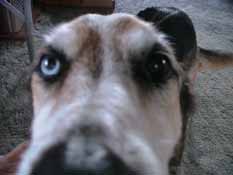I have a dog that I like to think is fairly intelligent. When teaching her commands, such as sit, stay, etc., it takes only a smallamount of repetition and training for her to grasp the concepts. Even after long periods of no training, usually weeks, she still remembersnewly taught commands with no review. She is also adept at solvingproblems such as learning how to open the front door and continually cominginto the house.
 |
Is this the bragging of a boastful and proud pet owner? Hardly. I bring up my dog’s apparent intelligence only for comparisonwith her “other side,” the stupid side. I am fascinated more withher ability to “screw-up” than with her intelligence. When she was younger, I watchedher get so excited that she did not anticipate or think ahead like sheusually would. She ended up walking into walls, the refrigerator,fell off steps, and even slipped off the boat dock into Puget Sound whereI used to live. She also had a bad habit of ingesting almost everythingin the yard. This dog ate things that would have make a billy goat puke. Nevertheless, she repeatedly ate the same items even though she got violentlyill. Despite her “intelligence,” she could not make the connection betweenher illness and the objects she had eaten.
What Is Intelligence?
The point I am trying to make is that judging intelligence in animals is usually a difficult task. The reason is that what we consider intelligent behavior may or may not be applicable to the animals we are working with. They are not human and cannot be expected to interpret the world the same way we do. My dog, for example, can be “smart” one moment, and then turn right around and do things that would make a toaster oven appear intelligent.
So in one sense, our definition of intelligence is a product of how we perceive the world, or our umwelt. We place value on it, such as saying, “This creature is stupid,” or “That creature is smart.” I want to emphasize those animal species that spend more time responding to their environment rather than “thinking” do not have poor quality lives simply because they lack intelligence. A wolf’s life, for example, is not necessarily “better” than a spider’s. Each is equipped to deal with its environment. To a mammal, however, intelligence can be an asset. This is particularly true for those species who use their wits as an adaptation for obtaining basic needs, i.e., food and shelter, instead of simply spinning webs or physically overpowering their enemies and prey. Many species do both. Some spiders can spin some elaborate and complicated webs. Does this take some amount of intelligence or is it mostly instinctual? Although some people would have strong opinions about the amount of intelligence in spiders, no one really knows.
The term “intelligence,” therefore, is abstract and involves more than only problem solving ability. It carries no inherent value. In other words, intelligent animals are not worth more or have more of a right to live than less intelligent animals. Intelligence simply exists. It is a survival tool used extensively by some species and moderately by others.
So what is a “smart” animal? As many people know, wolves have a reputation for being smart, and they are. But what does this mean? What is intelligence? There is no one good or correct definition of intelligence, although most of us have a sense of what it is. For example, after watching your household pets for a period of time you understand that they usually do not make decisions that hurt themselves or are self-destructive. In fact, they learn from their mistakes and make corrections. Learning from one’s mistakes is definitely a sign of intelligence, but is this trial and error or problem solving?
Forming And Using Generalized Rules
Although numerous criteria compose intelligence, creative problem solving is apparently a major component. Having this ability can keep animals alive longer because they can avoid or think their way out of dangerous situations. It may also improve the quality of their lives since they can find several different ways of doing something instead of only responding to their environment. In other words, intelligence can give them options they would not otherwise have.
Solving problems largely depends on the ability to form and use generalized rules acquired from past experience. These generalized rules are applied to a class of problems rather than to a single problem. For example, most people have learned that touching hot stoves causes pain and burns the skin. There is a relationship between heat and pain. This is learned quickly and usually is applied to similar relationships, such as matches and light bulbs. A generalized rule has now been formed - intensely hot things cause pain and burn your skin. This rule is used not only when encountering hot stoves but is applied to the class of all hot objects.
Good problem solvers, such as primates, humans, wolves, and cetaceans, use generalized rules. It is the degree to which animals use these rules that apparently makes them “smart” or “dumb.” Another name for this process is learning sets.